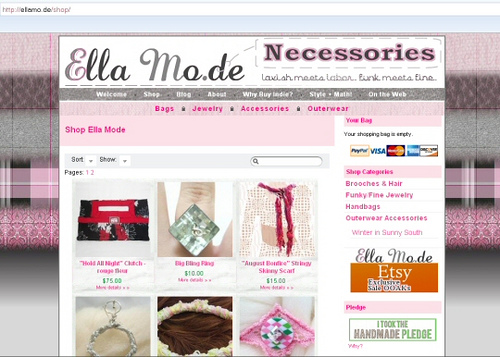<p>When consumers go online with the intention of buying a product, they’re often unaware of their own thought process and what influences their purchases. Many will only shop when there is a discount – after all, why pay more when there’s bound to be an offer at some point? Vouchers, coupons and discount offers are abundant, yet others are more wary of offers and will follow a different thought process altogether. How can you really work out what will appeal to your target market? Here we look into factors which affect consumer online spending:</p>
<h3><strong>Colour tones&#8230;</strong></h3>
<p style="text-align: center"><strong><img class="aligncenter" alt="" src="http://farm4.staticflickr.com/3164/3027563490_08ee16a6f1.jpg" width="510" height="367" /></strong></p>
<p>It is important to note that colour and website design have an overwhelmingly important role in consumer psychology with 92.6% of people stating that the visuals are the top influential factor for affecting a purchase decision. Logically, however, a website is the equivalent of a retail shop, which is a key part of consumer confidence. Products are assessed within 90 seconds and a quick initial judgment is made with 90% of that based on colour tones.</p>
<h3><strong>Videos&#8230;</strong></h3>
<p>Research by eMarketer.com in March 2012 showed that one in two customers have more confidence in a product after watching an online video. It’s the equivalent of picking up and playing with the product in-store. 31% bought the product after being influenced by the video and 41% would use a website that offered videos of products – especially if the videos are from other consumers.</p>
<h3><strong>Shopping cart abandonment&#8230;</strong></h3>
<p>Consumers who abandon their shopping basket at the last minute are divided into three main categories. In a study by the University of Glasgow and marketing company Amaze, they were named as “Vague”, “Cost Conscious” and “Window Shoppers”. The latter two are pretty self-explanatory, but the ‘Vagues’ (42% of online shoppers) are those who don’t make a purchase because they needed to look at what other people were saying about the company or product.</p>
<h3><strong>Customer reviews&#8230;</strong></h3>
<p>Customer reviews are very important to online shoppers – although some customer reviews have been known to be editorially placed by the companies themselves. Companies which responding to customer reviews (much like hoteliers do on TripAdvisor) can be seen as a positive. A study of 3,600 people in the US and Canada by BrightLocal (2013) found that 85% of consumers read online reviews for local businesses, and of those 79% trust the reviews as much as a personal recommendation.</p>
<p style="text-align: center"><img class="aligncenter" title="Reviews" alt="Customer Reviews" src="http://farm8.staticflickr.com/7136/6880124726_375077690c.jpg" width="510" height="264" /></p>
<h3><strong>Voucher code campaigns&#8230;</strong></h3>
<p>The appeal of voucher campaigns can vary from consumer to consumer. The more frugal online shopper will want to take advantage of offers, rather than pay full price. Bulk buys are attractive, but discounts with original selling prices as reference points are the most popular, so a voucher with a percentage off the original, or recommended retail price, is very attractive to customers.</p>
<p>The Nottingham University Business School (2005) ascertained that the higher the reference price, the higher the perceived value to the consumer for expensive products (TVs/holidays), but that this was not the case for cheaper products (chocolate bars or books)</p>
<p>A poorly thought through voucher campaign can do more harm than good, according to an MITSloan study. They cited three case studies, all of which made substantial losses in the month of a coupon campaign. Often, offering a deep discount will devalue a product in the eyes of the consumer. They will expect the same discount when they shop with you again. So be wary of flash-in-the-pan promotional prices in order to attract new customers, unless you are absolutely sure that your product is so unique and enticing that they will return for more at full price.</p>
<h3><strong>Customer research&#8230;</strong></h3>
<p>The amount of information available online allows customers to make a more informed decision on their purchases. But are they influenced more by price than quality? Consumers want the best price, but not necessarily the lowest price. These days online shoppers are more aware that unfeasibly low prices usually come with their own caveats and hidden prices (inflated shipping costs, say, or tax rates excluded from quoted price etc.)</p>
<p>It is certainly not easy to create a successful online business. Your online platform must represent your business and your products in and engaging manor, there must be no indications of error, your website design and branding must be flawless and your marketing campaigns must be fully researched. It is vital you understand your customer if you are to succeed. Most importantly, never be afraid to ask for feedback so you can improve in the necessary ways, rather than trying to second guess what your customers might be thinking.</p>
<h5>Featured images:</h5>
<p><span class="license">License: Creative Commons</span></p>
<p><span class="source">image source</span></p>
<p><span class="license">License: Creative Commons</span></p>
<p><span class="source">image source</span></p>
<p><strong>About the author:</strong> Kirstie is a web developer for vouchercloud. She has just been working on their new American site launch and has been analysing the latest figures regarding consumer psychology. Kirstie will work on designs for several months in order to achieve the best design layouts.</p>

Habits Of Today’s Online Shopper
